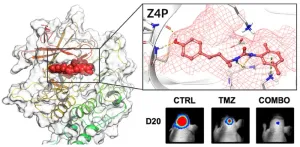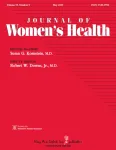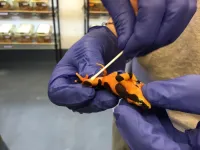(Press-News.org) Research Highlights:
An analysis of data for more than 58,000 women in the U.K. Biobank found that both short (less than 21 days) or long (more than 35 days) menstrual cycles were associated with the development of cardiovascular disease, heart attack or atrial fibrillation (AFib).
Short or long menstrual cycle length was associated with a 19% higher risk of heart disease among those women compared to women with menstrual cycle length between 22 to 34 days.
Irregular menstrual cycle length was associated with a 40% higher risk of atrial fibrillation.
Embargoed until 4 a.m. CT/5 a.m. ET Wednesday, May 24, 2023
DALLAS, May 24, 2023 — A study of more than 58,000 women over a 12-year period found that longer or shorter menstrual cycles were associated with a higher risk of developing cardiovascular disease, heart attack or atrial fibrillation (AFib), according to new research published today in the Journal of the American Heart Association, an open access, peer-reviewed journal of the American Heart Association.
Regular menstrual cycle length, defined as cycle length between 22 and 34 days, throughout a woman’s reproductive life reflects normal functioning of the connected hormone systems among the hypothalamus, pituitary gland and ovaries and are a vital indicator of overall health. Irregular menstrual cycles are a common endocrine disorder, with about 20% of women experiencing long cycles or cycles of varying lengths, according to previous research.
Previous research has found that irregular menstrual cycles are significantly related to multiple heart disease risk factors, including insulin resistance, high cholesterol, high blood pressure, chronic inflammation and polycystic ovarian syndrome. Other studies have found that women are at higher risk for arrhythmias, or irregular heartbeats, due to hormonal fluctuations of the menstrual cycle.
“The association between menstrual cycle characteristics and adverse cardiovascular outcomes remains unclear,” said senior author Huijie Zhang, M.D., Ph.D., chief physician and professor at Nanfang Hospital of Southern Medical University in China. “Considering the increasing prevalence of heart disease — with 45% of women in Western countries affected — and related mortality, there is a need to explore these risk factors.”
Researchers analyzed data from the U.K. Biobank to investigate whether menstrual cycle length, which was self-reported, was associated with overall heart disease and specific cardiovascular events in women. The U.K. Biobank is a large database of health information for more than 500,000 adults – enrolled from 2006 until 2010 – who receive care through the United Kingdom’s National Health Service. This study included health data for 58,056 women with an average age of 46 years at the beginning of the study period, as well as no cardiovascular disease. Health data was collected through four follow-up visits that took place from 2006-2010, 2012-2013, and in 2014 and 2019. Participants with menopause when the study began were excluded. The end of the study period was November 30, 2020, the most recent date for health data available for this analysis.
During a median follow-up period of 12 years, more than 1,600 cardiovascular events were noted among the participants, including coronary heart disease, heart attack, atrial fibrillation, stroke or heart failure. The analysis found:
Menstrual cycles less than 21 days or longer than 35 days were associated with a 19% higher risk of heart disease among those women compared to the women with regular menstrual cycle length, defined by this study as between 22 to 34 days, as well as a 40% higher risk of atrial fibrillation.
Shorter menstrual cycles were associated with a 29% higher risk of CVD events — including coronary heart disease, heart attack, atrial fibrillation, stroke and heart failure — and longer menstrual cycles were associated with an 11% higher risk of those CVD events, compared with regular-length menstrual cycles.
Shorter menstrual cycles were associated with a 38% higher risk of atrial fibrillation, and longer menstrual cycles were associated with a 30% higher risk atrial fibrillation, compared with regular length menstrual cycles.
Menstrual cycle length was not associated with an increased risk of stroke or heart failure.
These increased risks of cardiovascular disease were observed in the women independent of other risk factors, including age, ethnicity, BMI or body mass index, smoking status, drinking status, physical activity, baseline cholesterol levels, history of high blood pressure or Type 2 diabetes, history of oral contraceptive use or hormone replacement therapy, and family history of heart disease or stroke.
“Our analysis indicates that women with menstrual cycle dysfunction may experience adverse cardiovascular health consequences, therefore, we need to raise awareness that individuals with irregular menstrual cycle patterns may be more likely to develop heart disease,” Zhang said. “These findings have important public health implications for the prevention of atrial fibrillation and heart attack among women and highlight the importance of monitoring menstrual cycle characteristics throughout a woman’s reproductive life.”
The study had several limitations including that its question about menstrual regularity relied on the participant’s interpretation of irregular menstrual cycle length. The researchers could not rule out the potential impact of menopausal transition on irregular menstrual cycles because participant data at younger ages and including hormone levels were not available. Additionally, the U.K. Biobank dataset is a population of older adults (ages 40-69 years), the majority of whom self-identified as white, meaning the findings may not be generalizable to women from diverse racial or ethnic backgrounds or younger women.
Co-authors are Chensihan Huang, M.D.; Bingquan Lin, M.D.; Youwen Yuan, M.D.; Kangli Li, M.D.; Bingyan Xu, M.D.; Peizhen Zhang, M.D.; Xueyun Wei, M.D.; Weiwei Wang, M.D.; Wenhui Liu, M.D.; Yajuan Deng, M.D.; Deying Liu, M.D.; Jiayang Lin, M.D.; and Yan Huang, M.S. Authors’ disclosures are listed in the manuscript.
This study was funded by the National Key Research and Development Project, National Natural Science Foundation of China, the Joint Funds of the National Natural Science Foundation of China, Guangdong Basic and Applied Basic Research Foundation, and the Key-Area Clinical Research Program of Southern Medical University.
Statements and conclusions of studies published in the American Heart Association’s scientific journals are solely those of the study authors and do not necessarily reflect the Association’s policy or position. The Association makes no representation or guarantee as to their accuracy or reliability. The Association receives funding primarily from individuals; foundations and corporations (including pharmaceutical, device manufacturers and other companies) also make donations and fund specific Association programs and events. The Association has strict policies to prevent these relationships from influencing the science content. Revenues from pharmaceutical and biotech companies, device manufacturers and health insurance providers and the Association’s overall financial information are available here.
Additional Resources:
Multimedia is available on the right column of release link https://newsroom.heart.org/news/long-or-short-menstrual-cycles-linked-to-higher-risk-of-cvd-including-atrial-fibrillation?preview=1b3a45204c7861a9d4318543fe0156b3
After May 24, view the manuscript online.
AHA news release: Early menopause may raise risk of dementia later in life (March 2022)
AHA news release: Early menopause linked to higher risk of future coronary heart disease (May 2021)
AHA news release: Heart disease risk in women increases leading up to menopause; early intervention is key (Nov. 2020)
Follow AHA/ASA news on Twitter @HeartNews
Follow news from the Journal of the American Heart Association @JAHA_AHA
About the American Heart Association
The American Heart Association is a relentless force for a world of longer, healthier lives. We are dedicated to ensuring equitable health in all communities. Through collaboration with numerous organizations, and powered by millions of volunteers, we fund innovative research, advocate for the public’s health and share lifesaving resources. The Dallas-based organization has been a leading source of health information for nearly a century. Connect with us on heart.org, Facebook, Twitter or by calling 1-800-AHA-USA1.
###
END
Long or short menstrual cycles linked to higher risk of CVD including atrial fibrillation
Women with short or long menstrual cycles were more likely to have CVD events such as heart attack or AFib, finds new study in Journal of the American Heart Association
2023-05-24
ELSE PRESS RELEASES FROM THIS DATE:
Physical activities like a daily, 20-minute walk may help reduce disparities in heart health
2023-05-24
Statement Highlights:
Addressing low levels of physical activity among people in some targeted groups has the potential to improve equity in cardiovascular health.
Physical activity levels are lower among some population groups known to have higher cardiovascular disease risk, including adults who are older, female, Black, have depression, have disabilities, have lower socioeconomic status or live in rural areas.
It’s important to improve resources and opportunities to decrease barriers to physical activity. Physical activity initiatives should engage the community and ...
Cleft lip caused by combination of genes and environment
2023-05-24
A cleft lip or palate arises from the combined effects of genes and inflammatory risk factors experienced during pregnancy, such as smoking or infections, finds a new study led by UCL researchers.
The study, published in Nature Communications, has revealed for the first time how genetic and environmental factors come together to form a cleft lip or palate in a developing foetus.
Cleft lip, with or without cleft palate, is the most common craniofacial malformation seen at birth, affecting one in 700 live births. It can have devastating ...
Study finds association between long-term exposure to air pollution and severe COVID-19
2023-05-24
A long history of exposure to air pollution is associated with a higher risk of developing severe disease, admission to hospital or an intensive care unit (ICU) and death by COVID‑19 according to a study led by the Barcelona Institute for Global Health (ISGlobal), a research centre supported by the ”la Caixa” Foundation. The study, published in the journal Nature Communications, was based on a large cohort of 4,660,502 adults resident in Catalonia in 2020, the year the Spanish autonomous community had a high incidence of COVID-19.
The ...
Major progress in curing brain tumours
2023-05-24
Researchers at the University of Gothenburg, working with French colleagues, have successfully developed a method able to kill the aggressive brain tumour glioblastoma. By blocking certain functions in the cell with a docked molecule, the researchers cause the cancer to die of stress.
Cancer cells, especially those that form aggressive tumours, are in one way or another out of control and live a very stressful existence. To manage this stress, the cancer cells hijack mechanisms that the healthy cells use to regulate protein production and process the surplus proteins that they create. Without these hijacked mechanisms, ...
Computer‐aided diagnosis improves breast ultrasound expertise in multicenter study
2023-05-24
Leesburg, VA, May 17, 2023—According to an accepted manuscript published in ARRS’ own American Journal of Roentgenology (AJR), deep learning–based computer-aided diagnosis (CAD) for breast lesion classification on ultrasound significantly improved radiologists’ diagnostic performance—particularly for reducing the frequency of benign breast biopsies.
Compared with the literature supporting CAD at tertiary and/or urban centers, results from this prospective multicenter study of radiologists without ...
Not Just for Sleep: Melatonin awakens scientists to its health benefits for cattle
2023-05-24
STARKVILLE, Miss.— Those needing extra sleep often reach for the bottle of melatonin, but Mississippi State scientists are discovering a host of other proven and potential health benefits for cattle who receive the supplement.
MSU faculty and students in the Department of Animal and Dairy Sciences and the Mississippi Agricultural and Forestry Experiment Station are making intriguing discoveries about the functions of melatonin in the bovine body and how this hormone can help support cattle health.
MSU Associate Professor Caleb Lemley has an extensive history of studying the use of melatonin as a supplement in cattle. He has been studying how the ...
Racial disparities in outcomes for pregnant and postpartum veterans and their infants
2023-05-24
A new study showed that despite there being no significant racial disparities in access or use of care during the perinatal period among veterans using Veterans Administration care, Black veterans were more likely than white veterans to experience postpartum re-hospitalization and to have a low-birth-weight infant. The study is published in the peer-reviewed Journal of Women’s Health. Click here to read the article now.
Jodie Katon, PhD, MS, from VA Greater Los Angeles Healthcare System, and coauthors, reported that Black veterans were 67% more likely than white veterans to have a postpartum re-hospitalization and 67% more likely to have a low-birth-weight ...
Scientists from the Global South innovate to track ongoing amphibian pandemic
2023-05-24
The Panama Amphibian Rescue and Conservation Center at the Smithsonian Tropical Research Institute (STRI) in Panama partnered with the Centre for Cellular and Molecular Biology in India to develop and validate a new test for chytridiomycosis strains, offering new insights into a wildlife disease that caused dramatic declines of over 500 amphibian species and the extinction of 90 others. Their novel assay, published in the journal Transboundary and Emerging Diseases, identified previously undetected Indian strains, and successfully detected ...
AI tool outperforms human emergency call handlers in identifying stroke, new study shows
2023-05-24
(24 May 2023, Munich, Germany) A team of researchers from Denmark have developed a new artificial intelligence (AI) framework to address the number of strokes that go unrecognised by human emergency call handlers.1 The framework outperformed emergency call handlers in recognising stroke for both sexes and across all age groups studied, indicating its potential as a supplementary tool for early and precise stroke identification in the future.
The retrospective study, presented today at the European Stroke ...
Urban garden project seeks to reduce food insecurity and improve outcomes for people with HIV
2023-05-24
A University of Massachusetts Amherst public health scientist has received a five-year, $3.4 million grant from the National Institute of Mental Health to lead an urban gardening and peer nutritional counseling program aimed at improving the health of HIV-positive people with food insecurity in the Dominican Republic.
The project involving an international team of researchers and community partners is believed to the first full-scale trial to integrate nutritional counseling with food-generating ...
LAST 30 PRESS RELEASES:
Visible light-driven deracemization of α-aryl ketones synergistically catalyzed by thiophenols and chiral phosphoric acid
Most AI bots lack basic safety disclosures, study finds
How competitive gaming on discord fosters social connections
CU Anschutz School of Medicine receives best ranking in NIH funding in 20 years
Mayo Clinic opens patient information office in Cayman Islands
Phonon lasers unlock ultrabroadband acoustic frequency combs
Babies with an increased likelihood of autism may struggle to settle into deep, restorative sleep, according to a new study from the University of East Anglia.
National Reactor Innovation Center opens Molten Salt Thermophysical Examination Capability at INL
International Progressive MS Alliance awards €6.9 million to three studies researching therapies to address common symptoms of progressive MS
Can your soil’s color predict its health?
Biochar nanomaterials could transform medicine, energy, and climate solutions
Turning waste into power: scientists convert discarded phone batteries and industrial lignin into high-performance sodium battery materials
PhD student maps mysterious upper atmosphere of Uranus for the first time
Idaho National Laboratory to accelerate nuclear energy deployment with NVIDIA AI through the Genesis Mission
Blood test could help guide treatment decisions in germ cell tumors
New ‘scimitar-crested’ Spinosaurus species discovered in the central Sahara
“Cyborg” pancreatic organoids can monitor the maturation of islet cells
Technique to extract concepts from AI models can help steer and monitor model outputs
Study clarifies the cancer genome in domestic cats
Crested Spinosaurus fossil was aquatic, but lived 1,000 kilometers from the Tethys Sea
MULTI-evolve: Rapid evolution of complex multi-mutant proteins
A new method to steer AI output uncovers vulnerabilities and potential improvements
Why some objects in space look like snowmen
Flickering glacial climate may have shaped early human evolution
First AHA/ACC acute pulmonary embolism guideline: prompt diagnosis and treatment are key
Could “cyborg” transplants replace pancreatic tissue damaged by diabetes?
Hearing a molecule’s solo performance
Justice after trauma? Race, red tape keep sexual assault victims from compensation
Columbia researchers awarded ARPA-H funding to speed diagnosis of lymphatic disorders
James R. Downing, MD, to step down as president and CEO of St. Jude Children’s Research Hospital in late 2026
[Press-News.org] Long or short menstrual cycles linked to higher risk of CVD including atrial fibrillationWomen with short or long menstrual cycles were more likely to have CVD events such as heart attack or AFib, finds new study in Journal of the American Heart Association






